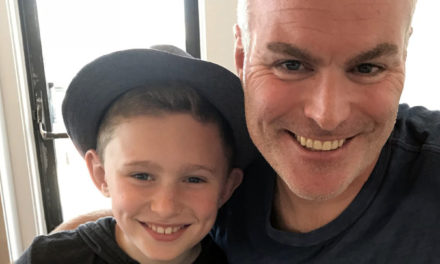Back when boxing was a sport people paid more attention to, my dad watched as much of it as he could. He would take over the living room to watch the Friday Night Fights or a Wide World of Sports special and wait with a sort of edgy eagerness we rarely ever saw. My dad was too cheap to spring for pay-per-view fights, choosing instead to find out which friends had before inviting himself over. When there was a title fight or two boxers he was particularly interested in, Dad would pace around the room waiting for the bell to sound like he was another fighter in the ring. He never sat down, instead he perched his butt on the edge of the coffee table, moved his shoulders with each jab and cross, and jumped up when the boxers mixed it up.
Having boxed for many years in Northern Ireland, where he grew up, Dad came by his love of the sport naturally. In his twenties, he fought as an amateur and worked as a sparring partner for pro boxers like Kid Gavilan. He was a true student of the sport. Where so many saw boxing as brutal and ugly, Dad saw its elegance and intricacy. That’s why he loved watching Muhammad Ali so much—because Ali brought speed and finesse to the traditional heavyweight slugfest. More than anything dad hated to see two fighters simply bash each other senseless. For him, boxing was so much more than simply slugging it out. It was a mental game made up of lightning fast moves—a chess match using the fists, feet, head, heart, and soul as the pieces. And that was Ali’s game.
From 1974 to 1991, Ali dominated the sport in a way no other fighter had done before or since. He was such a rare combination of grace, power, and speed. His hands were so quick that he didn’t have to cover up and lumber about like the other heavyweights, allowing him to verbally assault his opponents and then dance around them. Where they lurched, Ali bounced. His non-stop chatter got in their heads. And his every taunt was backed up by so much talent. Ali was such an amazing entertainer that all of us kids eventually join dad in the living room to watch him, especially his sit-down interviews with Howard Cosell on the Wide World of Sports back when the show delivered more substance on a Sunday afternoon than 24 hours of ESPN ever did. Like dad, we couldn’t get enough of Ali.
Dad had loved him since 1974, the year Ali fought George Foreman in Zaire to reclaim the heavyweight title that had been taken from him in 1967 when he refused to serve in the U.S. military. Since dad had always been against the Vietnam War, Ali’s ballsy act of defiance put him solidly in the boxer’s corner. More than anything, dad believed in standing up for the little guy and was outraged by the ongoing atrocities being inflicted upon African Americans in the South. For him, their fight for civil rights mirrored the oppression and violence he faced as a Catholic in Northern Ireland. In Ali, he saw himself—a scrawny kid from a segregated town with the wrong religion who had pulled himself up out of the dirt to prevail over a government that had done nothing but keep him down.
Ali once said, “Only a man who knows what it is like to be defeated can reach down to the bottom of his soul and come up with the extra ounce of power it takes to win when the match is even.” In the end, that kind of indomitable spirit was what will forever link Ali and my dad in my mind. Ali had been fighting Parkinsons for two decades before dad came face to face with the own degenerative condition—the one that would eventually bring him down. Like Parkinsons, my dad’s distal myopathy attacked the nervous system, cutting off the signals running up and down his spine and making him a prisoner in his own skin. It happened a lot faster with dad, but just like Ali, he saw his motor skills degenerate and his body shut down.
Dad battled his affliction with every fiber of his being until he died 4 years ago. The disease would take everything from him but it would never take his fight. He always he kept moving and held his head up. He never stopped throwing punches. Just like Ali.









